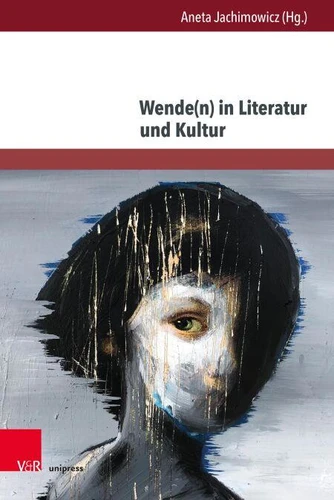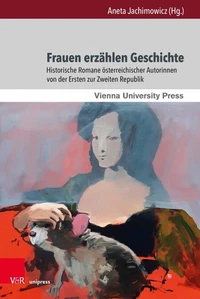Wende(n) in Literatur und Kultur. Aktuelle Konzeptualisierungen eines Motivs
Par :Formats :
Disponible dans votre compte client Decitre ou Furet du Nord dès validation de votre commande. Le format PDF est :
- Compatible avec une lecture sur My Vivlio (smartphone, tablette, ordinateur)
- Compatible avec une lecture sur liseuses Vivlio
- Pour les liseuses autres que Vivlio, vous devez utiliser le logiciel Adobe Digital Edition. Non compatible avec la lecture sur les liseuses Kindle, Remarkable et Sony
 , qui est-ce ?
, qui est-ce ?Notre partenaire de plateforme de lecture numérique où vous retrouverez l'ensemble de vos ebooks gratuitement
Pour en savoir plus sur nos ebooks, consultez notre aide en ligne ici
- Nombre de pages323
- FormatPDF
- ISBN978-3-8470-1710-3
- EAN9783847017103
- Date de parution06/05/2024
- Protection num.pas de protection
- Taille3 Mo
- Infos supplémentairespdf
- ÉditeurV&R Unipress
Résumé
Der Begriff »Wende« wird in der Literaturwissenschaft hauptsächlich in Bezug auf die Literatur der gesellschaftspolitischen Wende von 1989/90 sowie auf die sogenannten »turns« wie z. B. iconic turn, spatial turn, interpretative turn, performative turn oder cultural turn gebraucht. Diese zwei Wende-Erscheinungen determinieren den literaturwissenschaftlichen Diskurs seit etwa vierzig Jahren. Die Beiträge in diesem Band gehen über die etablierte Semantik von »Wende« hinaus.
Ein breiter Bogen wird gespannt von der Wende im Sinne einer Zeitenwende als Aufbruch und Neuorientierung oder Dystopie über die Wende als rhetorischer, künstlerischer oder medialer Entwurf, kollektives Erlebnis oder individualpsychologische Erfahrung bis hin zu weltanschaulichen, biographischen, politischen und existenziellen Wenden und schließlich auch einer Wende als narrative Struktur. In literary studies, the term "Wende" is mainly used in relation to the literature of the socio-political change in Germany of 1989/90 and to the so-called "turns", such as the iconic turn, spatial turn, interpretative turn, performative turn or cultural turn.
These two generic terms have determined the discourse in literary studies for more or less forty years. However, the contributions in this volume go beyond the established semantics of the turn. The focus is on turning-point phenomena and perceptions that - in the sense of a turning point - promised a new beginning and a new orientation. To what extent the historical, social, cultural and political turning points influenced literature in terms of content and form and what effects they had on the creation and reception of literature and culture - these are the central questions of this volume.
Ein breiter Bogen wird gespannt von der Wende im Sinne einer Zeitenwende als Aufbruch und Neuorientierung oder Dystopie über die Wende als rhetorischer, künstlerischer oder medialer Entwurf, kollektives Erlebnis oder individualpsychologische Erfahrung bis hin zu weltanschaulichen, biographischen, politischen und existenziellen Wenden und schließlich auch einer Wende als narrative Struktur. In literary studies, the term "Wende" is mainly used in relation to the literature of the socio-political change in Germany of 1989/90 and to the so-called "turns", such as the iconic turn, spatial turn, interpretative turn, performative turn or cultural turn.
These two generic terms have determined the discourse in literary studies for more or less forty years. However, the contributions in this volume go beyond the established semantics of the turn. The focus is on turning-point phenomena and perceptions that - in the sense of a turning point - promised a new beginning and a new orientation. To what extent the historical, social, cultural and political turning points influenced literature in terms of content and form and what effects they had on the creation and reception of literature and culture - these are the central questions of this volume.
Der Begriff »Wende« wird in der Literaturwissenschaft hauptsächlich in Bezug auf die Literatur der gesellschaftspolitischen Wende von 1989/90 sowie auf die sogenannten »turns« wie z. B. iconic turn, spatial turn, interpretative turn, performative turn oder cultural turn gebraucht. Diese zwei Wende-Erscheinungen determinieren den literaturwissenschaftlichen Diskurs seit etwa vierzig Jahren. Die Beiträge in diesem Band gehen über die etablierte Semantik von »Wende« hinaus.
Ein breiter Bogen wird gespannt von der Wende im Sinne einer Zeitenwende als Aufbruch und Neuorientierung oder Dystopie über die Wende als rhetorischer, künstlerischer oder medialer Entwurf, kollektives Erlebnis oder individualpsychologische Erfahrung bis hin zu weltanschaulichen, biographischen, politischen und existenziellen Wenden und schließlich auch einer Wende als narrative Struktur. In literary studies, the term "Wende" is mainly used in relation to the literature of the socio-political change in Germany of 1989/90 and to the so-called "turns", such as the iconic turn, spatial turn, interpretative turn, performative turn or cultural turn.
These two generic terms have determined the discourse in literary studies for more or less forty years. However, the contributions in this volume go beyond the established semantics of the turn. The focus is on turning-point phenomena and perceptions that - in the sense of a turning point - promised a new beginning and a new orientation. To what extent the historical, social, cultural and political turning points influenced literature in terms of content and form and what effects they had on the creation and reception of literature and culture - these are the central questions of this volume.
Ein breiter Bogen wird gespannt von der Wende im Sinne einer Zeitenwende als Aufbruch und Neuorientierung oder Dystopie über die Wende als rhetorischer, künstlerischer oder medialer Entwurf, kollektives Erlebnis oder individualpsychologische Erfahrung bis hin zu weltanschaulichen, biographischen, politischen und existenziellen Wenden und schließlich auch einer Wende als narrative Struktur. In literary studies, the term "Wende" is mainly used in relation to the literature of the socio-political change in Germany of 1989/90 and to the so-called "turns", such as the iconic turn, spatial turn, interpretative turn, performative turn or cultural turn.
These two generic terms have determined the discourse in literary studies for more or less forty years. However, the contributions in this volume go beyond the established semantics of the turn. The focus is on turning-point phenomena and perceptions that - in the sense of a turning point - promised a new beginning and a new orientation. To what extent the historical, social, cultural and political turning points influenced literature in terms of content and form and what effects they had on the creation and reception of literature and culture - these are the central questions of this volume.





